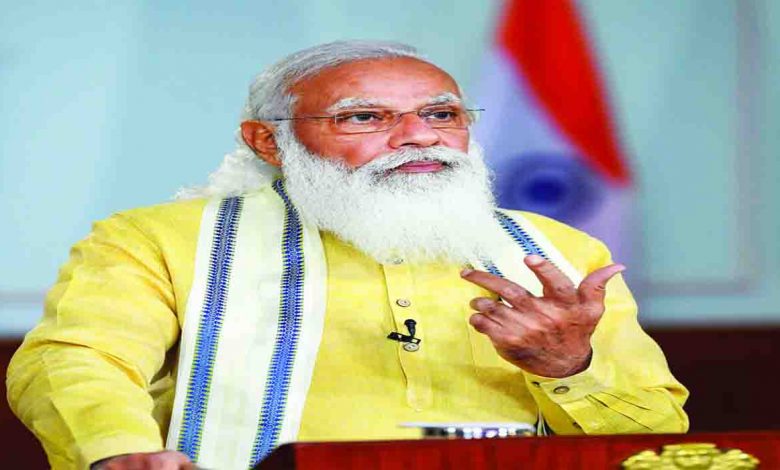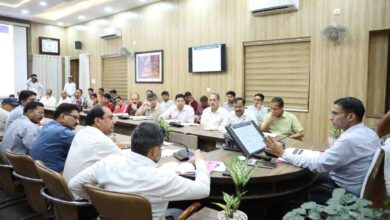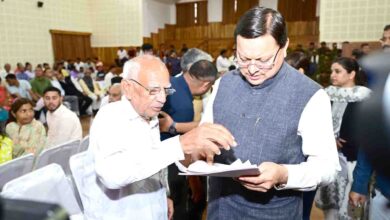‘One earth, one health’ united bid: Modi to G7

Sunday, 13 June 2021 | PNS | New Delhi
PM calls for equitable distribution of resources to fight Covid; US for G7 efforts to compete with China on developing world infra outreach
As the world battles the Covid-19 pandemic, Prime Minister Narendra Modi on Saturday called for “One Earth, One Health,” in apparent reference to collective effort to meet the challenge and equitable distribution of resources. He made this appeal while participating in the virtual ongoing G-7 summit in United Kingdom.
With the world now urgently needing vaccine to combat the pandemic, French President Emmanuel Macron favoured unhindered raw material supplies to countries like India to produce vaccine in large numbers, sources said.
Chancellor Angela Merkel specifically referred to Modi’s mantra and conveyed strong support, news agency ANI quoted GoI sources as saying.
Australian PM Scott Morisson referred to his discussions with PM Modi earlier about TRIPS waiver and conveyed strong support of Australia.
Modi also spoke on ways to come out of the pandemic at the earliest. He addressed the outreach session on Saturday and will speak again on Sunday morning.
He was invited to attend the summit by British Prime Minister Boris Johnson. Given the situation at home, Modi opted to participate in the prestigious meet virtually.
Modi had taken part in this event in 2019 when France chaired the G-7. India participated then as a “Goodwill Partner” and Modi participated in the sessions on “Climate, Biodiversity and Oceans” and “Digital Transformation”.
During the ongoing summit at Cromwall, Modi will virtually take part in three sessions on the themes “Building Back Stronger”, “Building Back Together” and “Building Back Greener”.
Meanwhile, according to news agency AP, the United States plans to push democratic allies to publicly call out China for forced labour practices as the Group of Seven leaders gathered at a summit where they will also unveil an infrastructure plan meant to compete with Beijing’s efforts in the developing world.
The provocative proposal is part of President Joe Biden’s escalating campaign to get fellow democratic leaders to present a more unified front to compete economically with China in the century ahead, according to two senior administration officials who briefed reporters on the condition of anonymity because they were not authorised to discuss the plans for the seaside summit publicly.
The officials said Biden wanted G-7 leaders to speak out in a single voice against forced labour practices targeting Uyghur Muslims and other ethnic minorities. Biden hopes the denunciation will be part of the joint communique released at the summit’s end, but some European allies have been reluctant to so forcefully split with Beijing. It may not be clear until the three-day summit ends on Sunday whether the leaders will take that step.
The wealthy nations’ leaders were all smiles and unity as they were welcomed to the summit on Friday by British Prime Minister Boris Johnson on the freshly raked sand of Carbis Bay in southwest England for their first gathering since 2019.
Last year’s gathering was cancelled because of Covid-19, and recovery from the pandemic is dominating this year’s discussions, with members of the wealthy democracies’ club expected to commit to sharing at least 1 billion vaccine shots with struggling countries.
China also loomed large over the meeting on the craggy coast of Cornwall. Biden’s proposed critique of China’s labour practices was to be raised as the allies unveil an infrastructure proposal dubbed “Build Back Better for the World,” a name that echoes the slogan of Biden’s poll campaign.
The plan calls for spending hundreds of millions of dollars in collaboration with the private sector. It’s designed to compete with China’s trillion-dollar “Belt and Road Initiative,” which has launched a network of projects and maritime lanes that already snake around large portions of the world, primarily Asia and Africa. Critics say the projects often create massive debt and expose nations to undue influence by Beijing.
Britain also wants the world’s democracies to become less reliant on economic giant China. The UK Government says Saturday’s discussions will tackle “how we can shape the global system to deliver for our people in support of our values,” including by diversifying supply chains that currently heavily depend on China.
Not every European power has viewed China in as harsh a light as Biden, who has painted the rivalry with the techno-security state as the defining competition for the 21st century. But there are signs that Europe is willing to put greater scrutiny on Beijing.
Weeks before Biden took office last year, the European Commission announced it had come to terms with Beijing on the Comprehensive Agreement on Investment, a deal meant to provide Europe and China greater access to each other’s markets. The Biden administration had hoped to have consultations on the pact.
But the deal has been put on hold, and the European Union in March announced sanctions targeting four Chinese officials involved with human rights abuses in Xinjiang. Beijing responded by imposing sanctions on several members of the European Parliament and other Europeans critical of the Chinese Communist Party.
Biden administration officials see the moment as an opportunity to take concrete action to speak out against China’s reliance on forced labour as an “affront to human dignity.”
While calling out China in the communique wouldn’t create any immediate penalties for Beijing, one senior administration official said the action was meant to send a message that the G-7 was serious about defending human rights and working together to eradicate the use of forced labor.
An estimated 1 million people or more – most of them Uyghurs – have been confined in reeducation camps in China’s western Xinjiang region in recent years, according to researchers. Chinese authorities have been accused of imposing forced labour, systematic forced birth control, torture and separating children from incarcerated parents.
Beijing rejects allegations that it is committing crimes.
The leaders of the G-7 – which also includes Canada, France, Germany, Italy and Japan – also hope the meeting at the seaside resort will energise the global economy.
Opening three days of talks, Johnson on Friday warned that world leaders must not repeat errors made over the past 18 months – or those made during the recovery from the 2008 global financial crisis. If not, he said the pandemic “risks being a lasting scar” that entrenched inequalities.
He said the G-7 will announce a package of health measures aimed at reducing the chances of another pandemic. The “Carbis Bay Declaration” will aim for a 100-day goal to develop vaccines, treatments and diagnostics for future diseases and to bolster surveillance for new illnesses.
Johnson said the goal of the measures was “to make sure that never again will we be caught unawares.” Brexit will also cast a shadow on the summit Saturday, as Johnson meets one-on-one with European leaders, including German Chancellor Angela Merkel and French President Emmanuel Macron, amid tensions over Britain’s implementation of UK-EU divorce terms.
Macron will also hold talks with Biden – a meeting between allies who recalibrated their relationship during the four years of President Donald Trump’s “America first” foreign policy.
Macron’s preference for multilateralism was out of step with Trump’s isolationist tendencies. But the Trump era was often framed by Macron as a clarifying moment – one in which Europe had to step forward as America drifted away from alliances and toward Trumpism.






